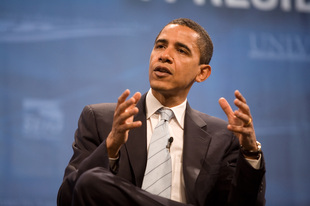Obama and “My Brother’s Keeper”: Empowerment and Mentoring
 PC: Center for American Progress Action Fund
PC: Center for American Progress Action Fund
Mentors. They might be friends or family, or maybe a teacher or coach. They might be a celebrity or an athlete, someone you aspire to be. The responsibility of a mentor is to set a repeatable and honorable example, and this individual is usually chosen out of admiration.
Who better to be a mentor than the President of the United States?
A few days ago, President Obama visited the Walker-Jones Education Campus, a local Washington-area school as part of his new effort “My Brother’s Keeper”, which aims to help black and Latino youth.
In the meeting, Mr. Obama fielded various questions from the students regarding his childhood, education and professional career. But the most interesting query came from an audience member who asked perhaps the most suitable question considering the presence on the receiving end.
“How do you deal with criticism?”
“I try not to watch TV,” Mr. Obama joked, chuckling. He also acknowledged that indeed, much of the world has a judgment about him. And it’s absolutely normal for people, especially young people, to wonder what others think about them. “That’s just human,” he said.
But Mr. Obama went on to differentiate between constructive criticism and those who are just looking to bring you down. These types of people- “haters”, he called them- would just look to criticize every small detail of everything you did.
It is often said that the President of the United States has perhaps the most difficult job in the world, more so than any other profession or world leader. We often forget, however, that these people are not impermeable- that they are wrought with the same daily afflictions as ourselves. It is how they have reacted in the presence of these struggles and have ultimately overcome them that solidifies their status as mentors.
Mentors had a huge impact on Arthur Ashe’s life. As a child, he sought the guidance of Ronald Charity, a college tennis player, and Dr. Walter Johnson, a tennis coach. These individuals taught and encouraged him to push limits and reach new heights. Throughout his career, Ashe also made it a point to empower and mentor youth, emphasizing the importance of education, health and well-being, active citizenship and self-reliance. His efforts are continued through organizations such as Virginia Heroes, National Junior Tennis and Learning, the Arthur Ashe Children’s Program and the Arthur Ashe Learning Center.
To read more about the President’s visit to the Washington School, check out this article.
Related Links:
Virginia Heroes: http://www.virginiaheroes.org/
Arthur Ashe Children’s Program:
http://www.wtef.org/east-capitol-programs/arthur-ashe-childrens-program/
Arthur Ashe Learning Center: http://www.arthurashe.org/
USTA/National Junior Tennis & Learning: http://www.usta.com/njtl/
Who better to be a mentor than the President of the United States?
A few days ago, President Obama visited the Walker-Jones Education Campus, a local Washington-area school as part of his new effort “My Brother’s Keeper”, which aims to help black and Latino youth.
In the meeting, Mr. Obama fielded various questions from the students regarding his childhood, education and professional career. But the most interesting query came from an audience member who asked perhaps the most suitable question considering the presence on the receiving end.
“How do you deal with criticism?”
“I try not to watch TV,” Mr. Obama joked, chuckling. He also acknowledged that indeed, much of the world has a judgment about him. And it’s absolutely normal for people, especially young people, to wonder what others think about them. “That’s just human,” he said.
But Mr. Obama went on to differentiate between constructive criticism and those who are just looking to bring you down. These types of people- “haters”, he called them- would just look to criticize every small detail of everything you did.
It is often said that the President of the United States has perhaps the most difficult job in the world, more so than any other profession or world leader. We often forget, however, that these people are not impermeable- that they are wrought with the same daily afflictions as ourselves. It is how they have reacted in the presence of these struggles and have ultimately overcome them that solidifies their status as mentors.
Mentors had a huge impact on Arthur Ashe’s life. As a child, he sought the guidance of Ronald Charity, a college tennis player, and Dr. Walter Johnson, a tennis coach. These individuals taught and encouraged him to push limits and reach new heights. Throughout his career, Ashe also made it a point to empower and mentor youth, emphasizing the importance of education, health and well-being, active citizenship and self-reliance. His efforts are continued through organizations such as Virginia Heroes, National Junior Tennis and Learning, the Arthur Ashe Children’s Program and the Arthur Ashe Learning Center.
To read more about the President’s visit to the Washington School, check out this article.
Related Links:
Virginia Heroes: http://www.virginiaheroes.org/
Arthur Ashe Children’s Program:
http://www.wtef.org/east-capitol-programs/arthur-ashe-childrens-program/
Arthur Ashe Learning Center: http://www.arthurashe.org/
USTA/National Junior Tennis & Learning: http://www.usta.com/njtl/
